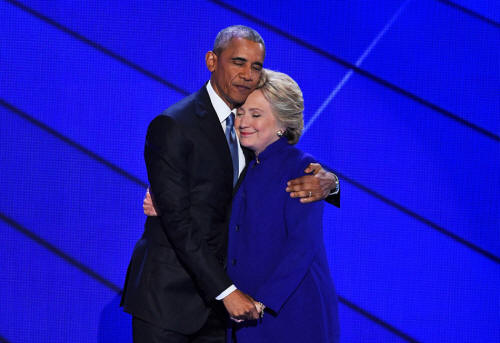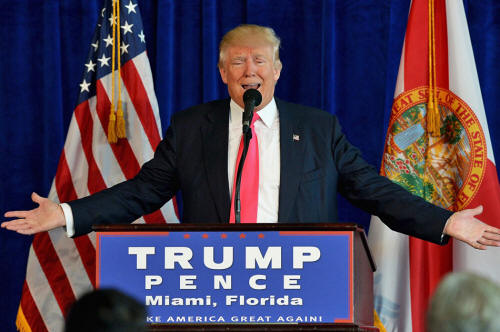|
at the biggest political show on earth, and found America telling stories about itself.
When I was a child, I always half-suspected that America wasn't real. It had to be made up.
It was too good and too simple a story
to make sense in the everyday world of bus stops and breakfast
cereals and adults who invariably let you down.
The American political machine is trying to pilot its next season.
Last week we had ten thousand terrifying Republicans going for a straight up tits-teeth-and-ammo exhibition, peddling fear and flag-waggery with a promise to rain down terrible vengeance on everything that irritates you:
This week it's the Democrats, with their tired-looking cast-members repeating lines that sounded hokey the first time in between guest appearances by beloved celebrities all hoping the networks won't cancel.
They've got the script and they've got the stars, but they're still trying to find the right narrative arc, because the American public's disbelief is rapidly losing suspension.
This is not politics, not as I know it
at home. This is something else. This is pantomime.
It reminds me, more than anything else, of a music festival, down to the overpriced snacks, the complicated entry system, the constant impression that the weather is trying to kill you, and the way that normal rules are suspended as we pretend, briefly, that another world is possible.
Specifically, world where the political process is simple and unsalable, and strong leaders can change things for the better. A world where hope is feasible and our votes matter and we all go, as Philip Larkin once said,
This is not how it's done in Britain.
Have you seen our politicians?
George Osborne looks like he's
lied for so long his two faces can't stand to be on the same head
anymore and are frantically pulling apart. Boris Johnson is
what would happen if you took Donald Trump out of the oven
too early and left him to rot on an English lawn.
In Britain, party conferences are square, airless affairs in seaside towns where squashed-looking people in suits eat warm quiche at the back of policy roundtables and protesters get rained on outside.
I have been to a number of these things,
and their version of putting on a show usually comes down to parties
in a local restaurant with the occasional glass of free buck's fizz
and bitchy political correspondents smoking outside, hoping the
Deputy Leader will put in an appearance, or maybe, if we're
lucky, Tony Robinson off Time Team.
Sequins, sparkles, wild promises, your
favorite celebrities, pizza costs seven dollars a slice, the stadium
is lit, balloons fall like platitudes from the rafters, the camera
zooms in on the delegates weeping with joy.
The question is,
Why? Because it feels good, and because
so little else does.
They make you feel good. They make you feel worthy, and pure, and moral, or at least like you could be all those things if you tried. They make you feel like you're a good person for trying. They make you feel like liberalism is a position that makes sense.
Everyone wants to believe that they are a good person...
Americans want to believe it more,
perhaps, than the rest of us, because their nation has done
and continues to do some very bad things both in the world
and to its own people in the name of a dream that is still a
nightmare for millions.
That's why this convention feels, at every stage, like a cross between a rock concert and a church revival. America is soaked in the language and practice of religion and wants to believe in its own goodness - in right as well as might.
The signs handed out to delegates,
Most of the taglines could have been lifted from the Bible - the Good News version, not the King James.
The Democrats are still pushing the
Gospels on a suspicious, skeptical congregation that's starting to
lose faith in the hereafter. The Republicans, meanwhile, have run
rabid and are reading straight from Revelations.
America The Brave is a bedtime
story, the kind you tell to scared kids who know full
well that the monsters are real. But for a moment there, I still
wanted Obama to tuck me in.
I saw him speak last night on a ten-foot television screen across a bar filled with tired reporters from all over the world, and I found myself remembering what it meant, in 2008, watching the life-stream from a filthy front room in Turnpike Lane, to believe - in that vague, childlike way - in hope.
Hope without affect, a thing with
feathers but no bones. I felt my heart twitch under my ribs. I felt
proud to be an American citizen. It took me ten full minutes to
remember that I wasn't one.
What is on show at the conventions is very different from the politics that exist, day to day, month to month, as a material force in people's material lives.
The conventions are a bubble universe
where we all, press and public and PR people and random rain-soaked
flunkies, try to float on suspension-strings of disbelief. We know
we're being lied to. Those complaining about the lies have
missed the point.
What did you expect? What's happening is here is more than just lies.
What speaker after party-faithful
speaker is doing, as they take the stage with the rosy-cheeks of
actors carved in wood and worked by levers, is telling stories.
Functionally, it's the same thing, but telling stories is a larger
and stranger thing than lying, in the way that war is a larger and
stranger thing than murder.
In the writer's room of US politics, the
scriptwriters have move beyond lies to the management of truth, the
creation of a master story that can explain all the other stories,
sweep them up, make us want to turn the page, knowing we can never
truly choose our own adventure.
They cannot persuade America, or the world, that liberalism is plausible, that change will come in a way that makes a meaningful difference to millions of lives; what they are offering, in practical terms, is the vestige of democracy against the certainty of dictatorship.
They are offering things not getting quite so much worse quite so fast. That's a hard sell. Here's how they're going to spin it. Here's the question on the table for American voters that will decide the fate of the world in the next decade.
People need something to believe in.
Believing you can be a better person
isn't the worst option of the many on offer right now. Particularly
as belief is, in its own way, a sort of magic. You can believe
things so hard and so desperately that they come halfway true.
She is offering you a vision of yourself as a better person, a person who can turn their face away from swivel-eyed, silent-screaming evil, a person who can vote to humble themselves like good parishoners before the altar of liberal equivocation and the drag-end of the American dream.
As visions go, it's viscerally
disappointing. I know you wanted more. We all did. But the
alternative is fear in the dark, and a horror story whose win
conditions can only be negotiated downwards.
I've been to the haunted house where hundreds of millions of ordinary people scream in dark corners for a story worth believing, clinging to what W.H. Auden called the "euphoric dream" of everyday redemption:
|



